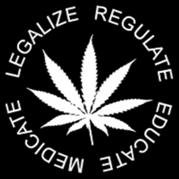
The California NAACP has endorsed a November ballot measure to legalize adult recreational use of marijuana, calling the measure a civil rights issue because blacks have a disproportionate number of arrests for marijuana possession compared with whites.
Accompanied by other African American leaders in California, the president of the state NAACP, Alice Huffman, said the current prohibition on marijuana has led to the criminalizing of young people and consequently has hampered the ability of many African Americans to prosper.
The organization is the most mainstream statewide entity to endorse the marijuana measure, Proposition 19, to date.
“This is not a war on the drug lords, this is a war against young men and women of color,” Huffman said, adding later that, “Once a young person is arrested and brought under the justice system, he or she is more likely to get caught in the criminal justice system again, further wasting tax dollars.”
Huffman and other leaders – including Aubry Stone, president of the California Black Chamber of Commerce – argued that money currently spent on enforcing marijuana laws would be better spent on education.
Prop. 19 would legalize cultivation, possession and transporting marijuana for personal use for people 21 or older. Local governments would be permitted to tax and regulate the production and sale of marijuana. It would still be illegal under federal law.
In announcing support, African American leaders pointed to a report that shows that in the 25 largest counties in California, blacks are arrested for possession of marijuana at rates that are as much as four times as high as those for white people. Those arrested are overwhelmingly young men.
Black people 18 to 25 years old use marijuana less frequently than whites, according to federal data in the National Survey on Drug Use and Health.
The report was written by Harry Levine, a sociology professor at Queens College at the City University of New York, who has researched similar trends in New York City. It was released by the Drug Policy Alliance, which is backing the ballot measure.
“In a nutshell, the police are assigned heavily to patrol only in certain neighborhoods and in those neighborhoods they are looking for certain suspects who are young, who are male,” Levine said, adding that police would make more arrests for marijuana possession if they focused on areas with higher concentrations of whites.
Stephen Gutwillig, California State Director of the Drug Policy Alliance, called the NAACP endorsement a “landmark moment.”
“This is the African American community establishment saying ‘enough is enough,’ ” Gutwillig said.
But the support is not shared throughout that community, as many black religious leaders are in opposition.
Bishop Ron Allen, leader of the International Faith Based Coalition and a member of the coalition opposing Prop. 19, said he was “shocked, stunned and surprised” by the endorsement and said it is not a civil rights issue.
“If anyone should know what illicit drugs will do to an underserved community, we expect our civil rights leaders to have a better understanding than anyone else,” he said.
Minorities and marijuana arrests
The NAACP endorsed Prop. 19, the recreational marijuana initiative, saying the measure is a civil rights issue. The civil rights group pointed to a study released by the Drug Policy Alliance, which found, among other things:
— In every one of the 25 largest counties in California, blacks are arrested for marijuana possession at higher rates than whites, typically at double, triple or even quadruple the rate of whites.
— U.S. government studies consistently find that young blacks use marijuana at lower rates than young whites.
— Marijuana possession arrests have serious consequences. They create permanent “drug arrest” records that can be easily found on the Internet by employers, landlords, schools, credit agencies, licensing boards and banks.
— Criminal records for marijuana possession severely limit the life chances of the poor, the young, and especially of young blacks and Latinos.